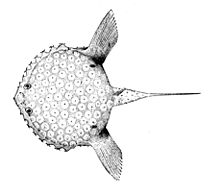Halieutichthys is a genus of marine ray-finned fishes belonging to the family Ogcocephalidae, the deep-sea batfishes or sea bats. The fishes in this genus are found in the western Atlantic Ocean.
| Halieutichthys | |
|---|---|

| |
| Pancake batfish (H. aculeatus) | |
| Scientific classification | |
| Domain: | Eukaryota |
| Kingdom: | Animalia |
| Phylum: | Chordata |
| Class: | Actinopterygii |
| Order: | Lophiiformes |
| Family: | Ogcocephalidae |
| Genus: | Halieutichthys Poey, 1863 |
| Type species | |
| Halieutichthys reticulatus Poey, 1863
| |
| Synonyms[1] | |
Taxonomy
editHaleutichthys was first proposed as a monospecific genus in 1863 by the Cuban zoologist Felipe Poey when he described Halieutichthys reticulatus,[1] the type locality was given as off Cuba. H. reticulatus is now considered to be a junior synonym of Lophius aculeatus which had been described by Samuel Mitchill in 1818.[2] Halieutichthys is divided into two clades, one being the H. aculeatus species complex with H. caribbaeus being the sister taxon to that clade.[3] This genus is classified within the "Eastern Pacific/Western Atlantic clade" of the family Ogcocephalidae.[4] The family Ogcocephalidae is classified in the monotypic suborder Ogcocephaloidei within the order Lophiiformes, the anglerfishes in the 5th edition of Fishes of the World.[5]
Etymology
editHalieutichthys combines the genus name Halieutaea, for the similarity of these fishes to the species in that genus, and ichthys, the Greek word for "fish".[6]
Species
editHalieutichthys currently contains four recognized species:[7]
| Image | Name | Common name | Distribution |
|---|---|---|---|
| Halieutichthys aculeatus Mitchill, 1818[3] | Pancake batfish | western Atlantic, North Carolina, northern Gulf of Mexico to northern South America | |
| Halieutichthys bispinosus H. C. Ho, Chakrabarty & Sparks, 2010[3] | Spiny batfish | Gulf of Mexico | |
| Halieutichthys caribbaeus Garman, 1896 | Caribbean batfish | Western central Atlantic: Caribbean Sea and the West Indies. | |
| Halieutichthys intermedius H.C. Ho, Chakrabarty & Sparks, 2010[3] | Louisiana pancake batfish | Gulf of Mexico |
Characteristics
editHalieutichthys batfishes have a flattened head and body which are widened into a rounded disc, with a moderately long tail. The mouth is very small, as is the illicial cavity on the snout which is covered by puffy, membranous folds. The esca is a single bulb. The pupils are covered. There is a buckler at the angle of the preoperculum which is not larger than the nearby bucklers. The openings of the gills are small and they are located to the rear of the upper base of the pectoral fins. The gill rakers are similar to small teeth set on short stalks. They have small dorsal and anal fins which are located to the rear of the body. The bases of the pectoral fins have a wide attachment to the body and the pelvic fins are not reduced in size. The lateral line is complete and there are a pair of lateral line organs on the caudal peduncle just in front of the anus. There are no tubercles along the lateral line. The scales are large, irregular and pitted, resembling small shields. The adults are scaleless on the underside of the body and large areas of the upperside are also without scales.[8] These are relatively small anglerfishes with the largest being H. aculeatus with a maximum published total length of 10 cm (3.9 in).[7]
Distribution and habitat
editHalieutichthys batfishes are found in the Western Atlantic Ocean. The aculeatus species group is found in the Gulf of Mexico and the southeastern coasts of the United States while H. cariibaeus is found in the Caribbean Sea and the West Indies. These fishes are found on sandy substrates at depths between 10 and 800 m (33 and 2,625 ft).[3]
References
edit- ^ a b Eschmeyer, William N.; Fricke, Ron & van der Laan, Richard (eds.). "Genera in the family Ogcocephalidae". Catalog of Fishes. California Academy of Sciences. Retrieved 19 May 2024.
- ^ Eschmeyer, William N.; Fricke, Ron & van der Laan, Richard (eds.). "Species in the genus Halieutichthys". Catalog of Fishes. California Academy of Sciences. Retrieved 19 May 2024.
- ^ a b c d e Ho, H. C.; Chakrabarty, P.; Sparks, J. S. (2010). "Review of the Halieutichthys aculeatus species complex (Lophiiformes: Ogcocephalidae), with descriptions of two new species". Journal of Fish Biology. 77 (4): 841–869. Bibcode:2010JFBio..77..841H. doi:10.1111/j.1095-8649.2010.02716.x. PMID 20840615.
- ^ Valerie Derouen; William B. Ludt; Hsuan-Ching Ho; Prosanta Chakrabarty (2015). "Examining evolutionary relationships and shifts in depth preferences in batfishes (Lophiiformes: Ogcocephalidae)". Molecular Phylogenetics and Evolution. 84: 27–33. Bibcode:2015MolPE..84...27D. doi:10.1016/j.ympev.2014.12.011. PMID 25554525.
- ^ Nelson, J.S.; Grande, T.C.; Wilson, M.V.H. (2016). Fishes of the World (5th ed.). Hoboken, NJ: John Wiley & Sons. pp. 508–518. doi:10.1002/9781119174844. ISBN 978-1-118-34233-6. LCCN 2015037522. OCLC 951899884. OL 25909650M.
- ^ Christopher Scharpf (14 November 2022). "Order LOPHIIFORMES (part 1): Families LOPHIIDAE, ANTENNARIIDAE, TETRABRACHIIDAE, LOPHICHTHYIDAE, BRACHIONICHTHYIDAE, CHAUNACIDAE and OGCOCEPHALIDAE". The ETYFish Project Fish Name Etymology Database. Christopher Scharpf. Retrieved 20 May 2024.
- ^ a b Froese, Rainer; Pauly, Daniel (eds.). "Species in genus Halieutichthys". FishBase. February 2024 version.
- ^ "Genus: Halieutichthys, Batfishes, Pancake Batfish, Seabats". Shorefishes of the Greater Caribbean online information system. Smithsonian Tropical Research Institute. Retrieved 20 May 2024.